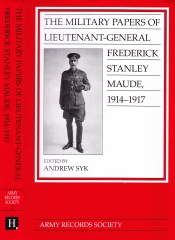Click here to view a text extract from this publication
 Published for the first time in this volume, the letters and diaries of Lieutenant-General Stanley Maude provide an illuminating insight into the Mesopotamian campaign and the role of command during the First World War. Maude died at the pinnacle of his career in November 1917 while commanding the Mesopotamia Expeditionary Force. He was the architect of a campaign which, in early 1917, had advanced the British occupation of Mesopotamia to Baghdad and beyond, thereby transforming the fortunes of the force.
Published for the first time in this volume, the letters and diaries of Lieutenant-General Stanley Maude provide an illuminating insight into the Mesopotamian campaign and the role of command during the First World War. Maude died at the pinnacle of his career in November 1917 while commanding the Mesopotamia Expeditionary Force. He was the architect of a campaign which, in early 1917, had advanced the British occupation of Mesopotamia to Baghdad and beyond, thereby transforming the fortunes of the force.As an officer of the Coldstream Guards, Maude first saw active service in the Sudan in 1885 and again during the Second Anglo-Boer War. His rise to the senior echelons of the British Army was, however, far from certain. Nonetheless, after August 1914, Maude’s abilities were increasingly recognised with accelerated promotion. His papers provide a window into the tactical, strategic, logistical and political issues that confronted him first as a staff officer during the Marine and Aisne offensives of 1914; as an infantry brigade commander during the emergence of trench warfare; commanding the 13th (Western) Division during the evacuation from Gallipoli and the failed relief of Kut-al-Amara in early 1916; and finally as General Officer Commanding the British and Indian forces in Mesopotamia from August 1916 until his death.